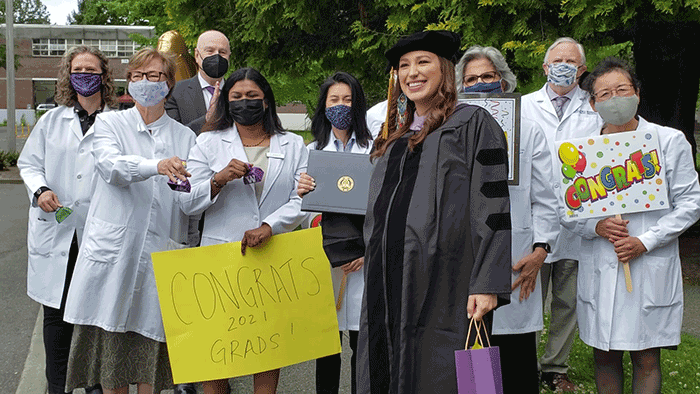This spring, Lindsey Montileaux Mabbutt celebrated two graduations: her own from the UW School of Dentistry and that of 10 students from her Dreamstarter program.
Thanks to the Dreamstarter grant, an award presented by Running Strong for American Indian Youth, Mabbutt could establish and complete her program, which educates Native American youth on careers in healthcare.
Running Strong for American Indian Youth is a nonprofit whose mission is to help Native American communities meet their immediate survival needs while implementing supporting programs designed to create opportunities for self-sufficiency and self-esteem. The organization was established by Billy Mills, who won the 10,000-meter run at the 1964 Tokyo Olympics, the only American ever to win gold in the event.

Mabbutt – now Dr. Mabbutt – started the program last Nov. 1, and it culminated on May 2 with a graduation ceremony for 10 students who participated in seven online sessions, one on the first Sunday of every month. The 10 students represented fifteen different Native American tribes, and the program was open to any indigenous student interested in pursuing a career in healthcare.
Dr. Mabbutt, who is enrolled in the Oglala Sioux Tribe in South Dakota, was inspired to create a program for Native students to find their passion, because when she was going through school she found it difficult to know which path to take.
“I’m a first-generation college student and I had no idea how to navigate higher education,” she said. “I went to many, many pre-admissions workshops during my time in undergrad, and then even still after finishing my master’s in public health I really wasn’t sure which career to pick.” After completing her master’s degree at North Dakota State University, Mabbutt wanted to pursue a career in the medical field, and she knew she had the drive to do so. She even took the Medical College Admission Test without being certain that she wanted to go to medical school.
“I ended up attending a dental-focused workshop that was actually funded through the same team, Running Strong with Billy Mills,” she said. “We got to do a lot with our hands, and the hands-on part of it really struck home with me, and I said, ‘Okay, I know this is it, this is what I want to do.” Mabbutt said that the Running Strong program she attended walked her through the application process and explained her chances of getting into different schools.
“I just had more confidence to pursue dentistry at that point, so from my own experiences I wanted to replicate that same sort of program for other Native students and then start earlier, start in high school, because I really struggled when I was in college.”
She reached out to Dr. Bea Gandara, who directs the School of Dentistry’s Office of Educational Partnerships and Diversity (OEPD), to help with the Dreamstarter grant application. “Especially since I was an attendee for one of the Running Strong’s programs, I knew about Dreamstarter, but I never had the infrastructure to actually apply because the funding and a lot of the on-the-ground work has to go to a nonprofit. So I asked Dr. Gandara if OEPD would support me and they said yes,” said Dr. Mabbutt.
“I was very happy to support Lindsey in this program because she and I have worked together since before she started dental school to encourage underrepresented minority youth to pursue dentistry and other health professions,” said Dr. Gandara. “She had good experiences participating in programs like this herself and wanted to bring this to the UW School of Dentistry.”
Once the funding was secured, Dr. Mabbutt established a lesson plan for the students. “Each month the participants received a box that aligned with that month’s theme,” she said. The program focused on multiple health professions, so each month was dedicated to a specific field.
“They were mailed boxes, and within each box we included hands-on activities and information for that profession,” she said. “So for dentistry, the box they got included information about dental school, and we included a soap carving activity where you carved teeth out of soap. For our veterinary medicine day, they got animal models, and [for the] nursing day they got a stethoscope kit.”
Along with creating the hands-on activities, Dr. Mabbutt would reach out across the country to the respective public health professionals from Native backgrounds to speak to the students. “After that it would be time for Q and A, and then we’d have a presentation sort of about what the journey into that profession is like. Then we did the hands-on activity.”
Dr. Mabbutt has accepted a job with the Swinomish tribe in Washington as a general dentist with the tribe. She is confident that her program will continue after she departs. “The school has agreed to try and make the program sustainable, and [although] we don’t have the official funding from Dreamstarter to do this next year… they do have opportunities for us to re-apply, so I think the chances of us being able to continue the program are really high,” she said.
“I am very satisfied with the way the program turned out,” said Dr. Gandara. “We will seek more funding and hope to continue with a hybrid model where we can have online sessions and also meet with the students at their schools or at the dental school to build a supportive community.”